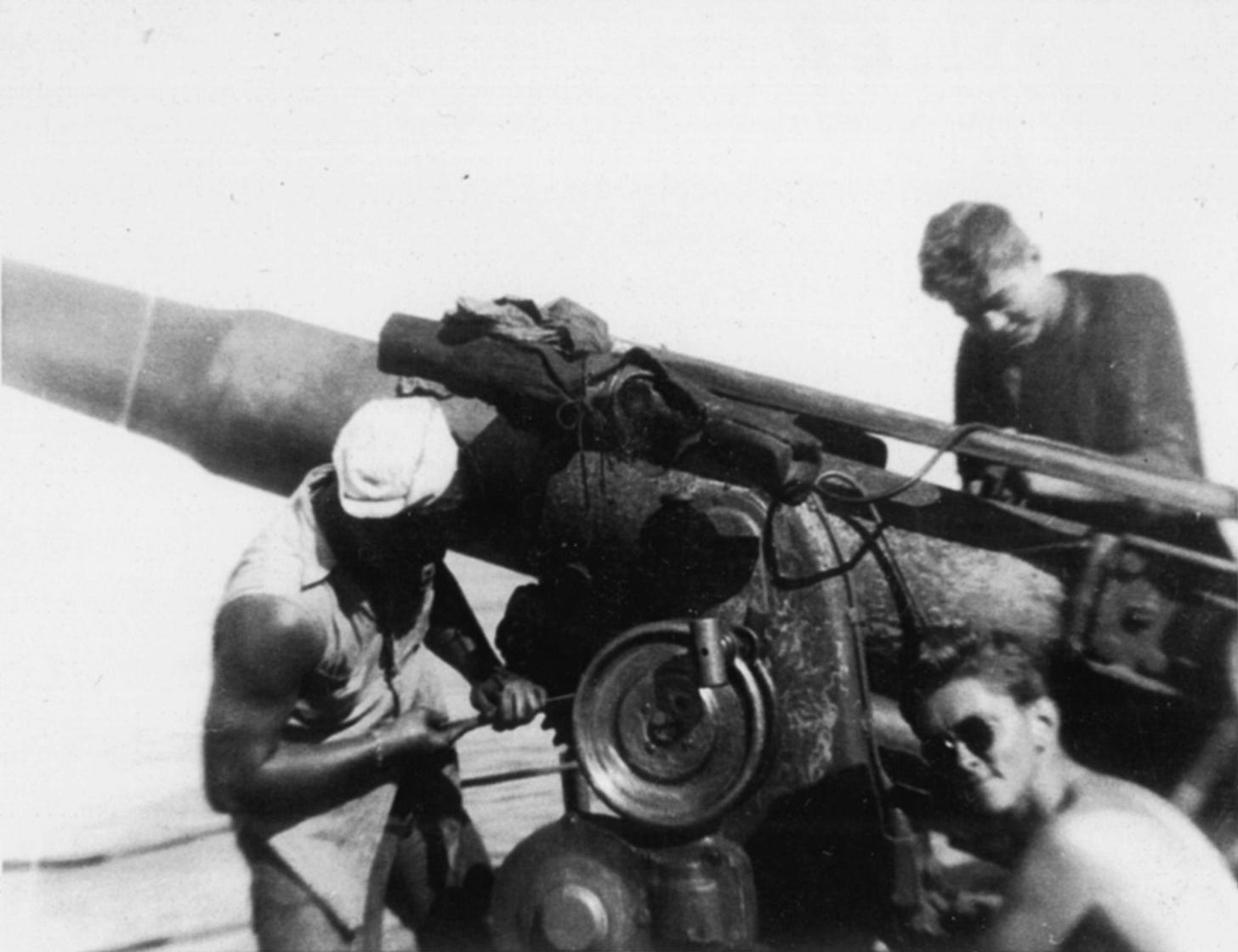Crossing the Equator
My dad went into the Navy during WWII, and served in all three major theaters, the Atlantic, the Mediterranean, and the Pacific. Like a lot of other combat vets – and not unlike cops, or firefighters, or EMT’s – they only tell the funny stories, usually where they’re the butt of the joke.
He went to sea on a Liberty ship, as the commander of a Navy gun crew. Merchant Marine were armed, a 3” gun forward, a 4” gun aft, and four 20MM Oerlikon machine guns. The heavier gun was mounted at the stern, to fight off pursuit. In a surface engagement, you were instructed to evade or escape. The odd wrinkle in this, as my dad later explained, was that the Merchant Marine captain skippered the boat; the Navy officer only took command if the vessel came under attack. The guys my father served under were twenty years older, grizzled salts, and he was no more than a shavetail lieutenant, j.g., with a cheerful manner.
They collided with another ship, in convoy, in the Pentland Firth, south of the Orkney Islands, and managed to limp into Scapa Flow - Scapa Flow a huge Royal Navy base, unhappily famous early in the war when a U-boat slipped through its defenses and torpedoed a battleship. Also noted in the logbook: Stover, B.R., Seaman 1st, reported discharge which appeared to be gonorrhea, five-day sulfa treatment prescribed. (Lt. Gates apparently acting medical officer; previous port of call had been Liverpool.)
Gibraltar, en route to Oran. Several of the gun crew, on shore leave, get busted for disorderly by the British MP’s and hauled off to the clink. The lieutenant has to go bail them out. The stockade is down in the bowels of the Rock, and as he goes deeper, the steps cut by hand into the limestone walls, perhaps by the Moors, or maybe the Neanderthals, he feels himself going back in geological time. The guys, scared sober, are all too grateful he’s shown up. It’s not just medieval, they tell him, it’s like before we even invented fire.
On the way to the Indian Ocean, they run aground in the Suez Canal, the skipper drunk in his quarters. The lieutenant, mind, isn’t steering the boat, and he’s already made his thoughts clear. The captain is defensive, surly, and incompetent, Lt. Gates confides privately to the logbook. All the same, nobody blows the whistle, when Naval Intelligence comes aboard to investigate. They smell a rat, of course, but leave empty-handed. My dad never explained why; there was friction between the Merchant Marine and the Navy sailors, and between the captain and himself, and he chose not to take the easy out, when it came along, to throw Capt. Cronquist over the side. It was loyalty to the ship, not the man. That’s all I got.
[Another footnote, recorded Jan. 11th, 1944. Bubonic plague in Port Said. Talk about the Middle Ages.]
There’s an old Navy tradition, that when you sail across the Equator for the first time, you get baptized, in a ceremony presided over by King Neptune, or Davy Jones. At the least, a rite of passage, and an excuse for a party. I have a snapshot of my dad, on deck in bright daylight, and grinning, wearing nothing but his skivvies. Who took the picture? No way of knowing. But somebody’s written on the back, “Winner, Scantiest Costume.”
My dad’s Liberty ship, the Charles D. McIver, hit a mine in March of 1945, off of Antwerp. By then, my father and the crew he’d served with were back in Hoboken, safe ashore. The crew aboard the vessel at the time of the incident were rescued, but the McIver was lost.




